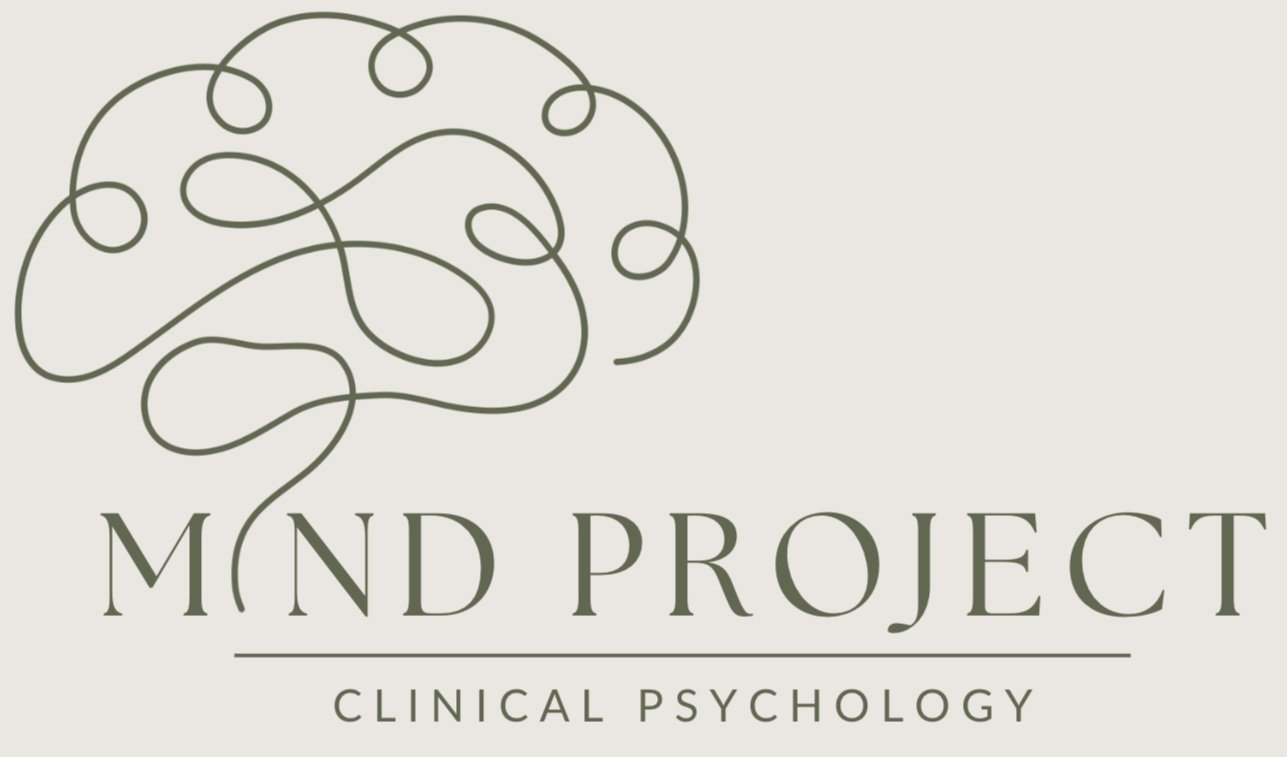Services
Mind Project provides high-quality, evidence-based psychological therapy.
Work and Development Orders (WDO) available.
Australian Defense Force/Open Arms-BUPA accredited.
Telehealth is available.
Our clinicians are well-versed in treating a range of mental health concerns, including:
-
Fear is a universal experience, but when anxiety becomes persistent, disproportionate, or debilitating, it’s likely someone is suffering from an Anxiety Disorder.
Common symptoms of anxiety include excessive worry, feeling restless, having difficulty concentrating, muscle tension, rapid heartbeat, sweating, trembling, shortness of breath, difficulty breathing, upset stomach (‘butterflies’), nausea, diarrhea, feeling dizzy, dissociation and lightheadedness. Anxiety is often accompanied by marked avoidance of situations and places that induce distress.
Generalized Anxiety Disorder (GAD): characterized by excessive and unrealistic worry about everyday events or activities, accompanied by physical symptoms such as fatigue, restlessness, and irritability.
Panic Disorder: involves recurrent and unexpected panic attacks, which are sudden episodes of intense fear, accompanied by strong physical symptoms.
Agoraphobia: involves a fear of having a panic attack in certain situations where escape may be difficult or help may not be available, such as crowds, public transportation, or open spaces.
Social Anxiety Disorder (SAD): characterized by extreme anxiety in social situations, leading to avoidance of such situations or enduring them with significant distress.
Health Anxiety: a condition where a person experiences excessive worry about their health, despite having no or minimal physical symptoms.
Specific Phobias: involves an irrational fear of a specific object, situation, or activity, leading to avoidance of the feared stimulus.
Separation Anxiety Disorder: often diagnosed in children, it involves excessive and developmentally inappropriate anxiety about separation from a caregiver or loved one.
-
Everybody feels sad from time to time - feeling flat, ‘off’, and even de-motivated. But when feelings are intense, persistent, or disproportionate to the situation, someone may be suffering from a Mood Disorder.
Major Depressive Disorder (MDD): may involve persistent feelings of sadness, hopelessness, guilt, loss of motivation, and a loss of interest in activities that were once enjoyable. It can be accompanied by symptoms such as changes in appetite, sleep patterns, and fatigue.
Bipolar Disorder: characterized by episodes of both depression and mania, which is a period of elevated, irritable, or euphoric mood, increased energy, and sometimes impulsive behavior.
Persistent Depressive Disorder (PDD): previously called dysthymia, it involves chronic feelings of sadness or low mood, along with other depressive symptoms, lasting at least two years.
Seasonal Affective Disorder (SAD): a type of depression that occurs during the winter months when there is less sunlight.
Adjustment Disorder with Depressed Mood: occurs in response to a stressful life event, such as a death or divorce.
-
Unfortunately, trauma is all too common - and it has consequences. Though some might recover relatively quickly in the aftermath of a trauma, others remain deeply and profoundly impacted.
Post-Traumatic Stress Disorder (PTSD): is characterized by intrusive memories, nightmares, negative changes in thoughts and mood, hyperarousal, and avoidance of things and places associated with the trauma.
Acute Stress Disorder (ASD): similar to PTSD but occurs within one month after a traumatic event, and the symptoms are typically more short-lived.
Adjustment Disorder (with anxiety/depression): occurs in response to a stressful life event, such as a divorce or job loss, and involves cognitive, emotional, and behavioural changes that significantly impact people’s quality of life.
-
Obsessive-Compulsive Disorder and Related Disorders are characterized by repetitive thoughts, urges, and/or behaviors that casue distress and significantly interfere with a person's daily life.
Obsessive-Compulsive Disorder (OCD): is characterized by unwanted, intrusive thoughts or images that lead to repetitive behaviors or mental acts that the individual feels compelled to perform to reduce distress.
Body Dysmorphic Disorder (BDD): a person with BDD is preoccupied with one or more perceived flaws in their appearance that are not observable or appear minor to others. This preoccupation can lead to repetitive behaviors such as checking one's appearance, seeking reassurance from others, or undergoing unnecessary medical procedures.
Hoarding Disorder: a persistent difficulty discarding or parting with possessions, regardless of their actual value. This difficulty leads to clutter and disorganization.
-
Addiction is a complex issue that involves an inability to stop using a substance or engaging in problematic behaviours despite the harm. It often involves cravings, withdrawal symptoms, tolerance, and an excessive preoccupation with acquiring the addictive substance or engaging in the addictive behaviour.
Substance Use Disorders (SUD): Symptoms fall into four main categories:
1) Impaired control: using more of a substance than intended or intending to cut back but being unable to.
2) Social Problems: neglected responsibilities and relationships, giving up activities that one once valued, and an inability to complete important tasks at home, school, or work.
3) Risky Use: using in risky settings or continuing to use despite the known harm.
4) Physical Dependence: Needing more of the substance to get the same effect (tolerance) and withdrawal symptoms.
Gambling Disorder: involves persistent and recurrent problematic gambling that leads to significant impairment or distress. Some of its key features include:
1) Preoccupation: spending an excessive amount of time thinking about gambling, planning future gambling activities, or reliving past gambling experiences.
2) Need to gamble with increasing amounts of money: An individual may need to increase their gambling bets or frequency to achieve the desired level of excitement. Considered a type of tolerance.
3) Inability to control or stop gambling: Despite efforts to cut back or quit, an individual with gambling disorder may feel unable to control or stop.
4) Withdrawal symptoms: When an individual tries to stop or reduce their gambling behavior, they may experience withdrawal symptoms such as irritability, restlessness, or anxiety.
5) Continued gambling despite known negative consequences: gambling can cause financial difficulties, relationship problems, and legal troubles among others.
6) Relying on others for financial support: An individual with gambling disorder may rely on others for financial support due to financial problems caused by their gambling behavior.
Internet Gaming Disorder: While the internet can provide many benefits and opportunities, internet addiction refers to excessive and compulsive use of the internet that can interferes with daily life activities, such as work, school, and personal relationships. People with this issue may experience withdrawal symptoms when they are unable to access the internet, they may neglect other important aspects of their life to use the internet, or they may feel a lack of control over their use. It can manifest in various forms, such as excessive use of social media, online gaming, online shopping, or pornography.
-
Pain aids survival.
It lets us know we are hurt or ill and motivates us to rest and avoid certain harmful activities - which promotes recovery. As pain abates, it serves as a signal to resume activities.
However, sometimes pain can persist well after an injury or illness has healed - and sometimes in the complete absence of tissue damage. This is Chronic Pain - prolonged pain that no longer serves an adaptive function. It can impact one’s quality of life, mobility, relationships, work, and cause significant psychological and emotional distress.
Chronic Pain is a complex problem. It’s not simply a physical sensation, but a multifaceted experience that involves biological, psychological, and social dimensions. Psychological treatment for chronic pain seeks to leverage these dimensions to reduce pain, reduce the distress associated with pain, and help people thrive - despite pain.
-
BPD is a challenging condition that often emerges in the context of abuse, trauma, neglect, and/ or abandonment throughout childhood and the adolescent years.
It is characterized by intense, unstable emotions, impulsive and risky behaviours, a distorted self-image, difficulty maintaining relationships due to fears of abandonment, and issues with self-harm and suicidal ideation.
BPD can be a major struggle - but with the right treatment and support, symptoms and quality of life can be markedly improved.
-
Attention-deficit/hyperactivity disorder (ADHD) is a neurodevelopmental disorder that affects individuals across their lifespan. It is characterized by symptoms of inattention, hyperactivity, and impulsivity, which can affect a person's academic, occupational, and social functioning. Symptoms of inattention may include difficulty focusing on tasks, forgetfulness, disorganization, and poor time management. Symptoms of hyperactivity and impulsivity may include restlessness, fidgeting, interrupting others, and acting on impulse without considering the consequences. People with ADHD frequently suffer from other mental health issues.
The front-line treatment for ADHD is stimulant medication, however, psychological therapy has demonstrated benefits in organizational skills, time management, and emotion regulation. Though, of course, treatment should always be individualized based on the goals and needs of the client.

What to expect at Mind Project
When you feel ready, you can book online or call our friendly admin team at (02) 9054 5872.
It’s worthwhile seeing your GP to obtain a Mental Health Care plan. This will give you 10 Medicare rebated sessions per year. Simply chat with your GP. They’ll know what to do.
1. Book your Initial Consultation
During the first session, your psychologist will ask questions about your situation and experiences to develop a deep understanding of what is going on for you – and why. You are also free to ask any and all questions.
There is often a lot to get through in the first session but we usually try to offer some psychoeducation (information about your mental health concern) and some homework (an important step towards getting better).
2. Attend
Together, you and your psychologist will develop an effective treatment plan. This will involve a specific and achievable goal, tailored to your needs. Expect clear solutions to complex problems.
3. Develop a Treatment Plan
What therapy looks like varies from person to person and from problem to problem. However, it should always involve educating and upskilling clients, enabling them to become experts in ‘treating themselves’.
4. Undergo therapy
As therapy progresses, it’s important to ensure that it’s working!
This can be achieved through formal psychometric testing (questionnaires relevant to your mental health concern), tracking progress towards a specific goal, and checking in with you – the client – to confirm your satisfaction with the treatment.

